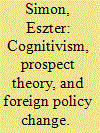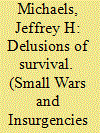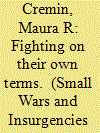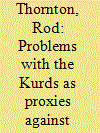|
|
|
Sort Order |
|
|
|
Items / Page
|
|
|
|
|
|
|
| Srl | Item |
| 1 |
ID:
146209


|
|
|
|
|
| Summary/Abstract |
This article investigates the cognitive limitations on policy change in counterinsurgency (COIN) efforts by examining why American decision-makers failed to revise their government strategy substantially while fighting the insurgency in Afghanistan in 2003–2014 and why their British counterparts were more successful in adjusting their policies in the Malayan insurgency in 1948–1954. Unlike most of the COIN literature that concentrates on military strategy and tactics, the analysis of government policy-making in Malaya holds some important political lessons for American leaders today despite differences between the insurgencies in Afghanistan and British Malaya. As a response to the criticism of COIN studies in general that they lack theoretical guidance, this article utilizes an integrated cognitivist-prospect theory framework. It is argued that some of the COIN literature mistakenly suggests that a more difficult strategic situation was primarily responsible for American failure in Afghanistan. Instead, American decision-makers faced a more difficult task cognitively than their British counterparts, as policy change in Afghanistan would have required greater ideational change. American principals were much more attached to their beliefs emotionally, had no alternative problem representation, and had to shift between frames in order to engineer a response that was more in line with events on the ground in Afghanistan. Regarding prospect theory, findings indicate that gains frames appear to be unhelpful in monitoring progress until catastrophic failure endangers the reference point, and that decision-makers often have more than one reference point to attune their policies to, which often results in suboptimal choices with regard to at least one reference point.
|
|
|
|
|
|
|
|
|
|
|
|
|
|
|
|
| 2 |
ID:
146212


|
|
|
|
|
| Summary/Abstract |
When North Vietnam launched a military offensive in March 1975, there was little expectation that South Vietnam would collapse 55 days later. As the South’s forces quickly crumbled and the scale of the military disaster became increasingly apparent, the United States considered a number of options to provide emergency assistance to its ally. This article will examine the evolution of the diplomatic, economic, military, and covert options US policymakers developed to support the South during the Final Offensive. These policy options will be set against the backdrop of the ‘scripts’ US officials devised to justify emergency assistance, as well as their delusions about the South’s prospects for survival.
|
|
|
|
|
|
|
|
|
|
|
|
|
|
|
|
| 3 |
ID:
146210


|
|
|
|
|
| Summary/Abstract |
The 1919-1921 Anglo-Irish War represents one of the earliest instances of a successful insurgent movement in the twentieth century. By combining a fluid organizational structure with effective hit-and-run tactics and accurate intelligence, the Irish Republican Army was able to defeat militarily the security forces of Great Britain. Combined with a successful propaganda campaign, these tactics allowed the IRA to drive the British to the negotiating table, where its representatives secured greater autonomy than Ireland had known in centuries. The outcome of the Anglo-Irish War demonstrates the success which a well-organized guerrilla campaign can achieve, and the tactics used by the IRA must therefore be understood by any serious student of small warfare.
|
|
|
|
|
|
|
|
|
|
|
|
|
|
|
|
| 4 |
ID:
146208


|
|
|
|
|
| Summary/Abstract |
The siege of the northern Syrian town of Kobane was lifted in January 2015. The Kurdish defenders there had triumphed against Islamic State (IS). The conflict then moved on. It moved on, though, with the United States, the United Kingdom, and other Western powers having adopted, almost by default, the Kurds as proxy fighters in this conflict. The Kurds, however, are a divided and fractious nation spread across three states and historically famous for fighting among themselves. In employing the Kurds as proxies against IS, as this article shows, these Western powers must be aware of the unintended consequences that can result.
|
|
|
|
|
|
|
|
|
|
|
|
|
|
|
|
| 5 |
ID:
146211


|
|
|
|
|
| Summary/Abstract |
This article re-examines part of the literature on Britain’s role in the December 1979 to March 1980 Zimbabwe/Rhodesia ceasefire. The ceasefire ushered in an era of peace after a protracted internal war and it was an integral part of the transition from colonial white minority rule, towards black majority independence. Scholars present Britain’s success in brokering and monitoring the Zimbabwe/Rhodesia ceasefire as the result of its judicious and accordant management of the road to peace. However, this article argues that in fact deep internal divisions plagued the British managers of the ceasefire. Internal divisions centred on authority struggles between diplomats and military actors, conflicting personalities, discordant approaches to and goals in the ceasefire, and inter-institutional rivalry between the Foreign Office and Ministry of Defence. The article concludes that Britain only managed the ceasefire effectively because its military’s independence, political nous, and competence ultimately prevailed over the injudicious views and machinations of diplomats.
|
|
|
|
|
|
|
|
|
|
|
|
|
|
|
|
|
|
|
|
|